Want to save with Paschal? Don’t miss our current offers and specials

Want to save with Paschal? Don’t miss our current offers and specials
Return to Paschal Resource & Education Hub
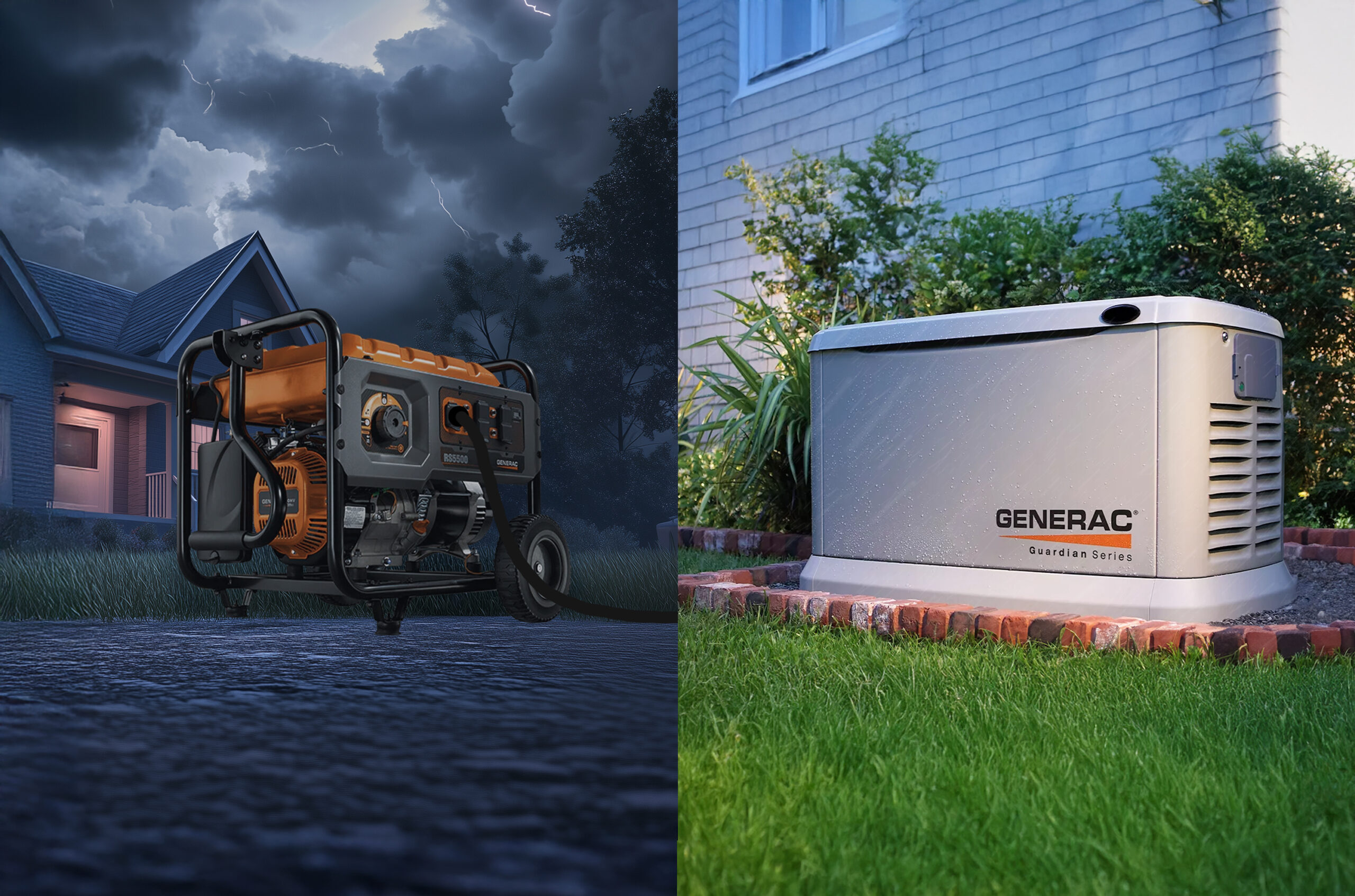
When the unexpected happens—storms, blackouts, or grid failures—you need to know your home is protected. A generator gives you confidence that your essentials will keep running, no matter what’s happening outside.
Choosing between a portable generator and a whole home generator can be challenging, especially if you’re not familiar with the pros and cons of each type of generator. In this article, we’ll compare portable generators and whole home generators to help you determine which type is best for your home and needs.
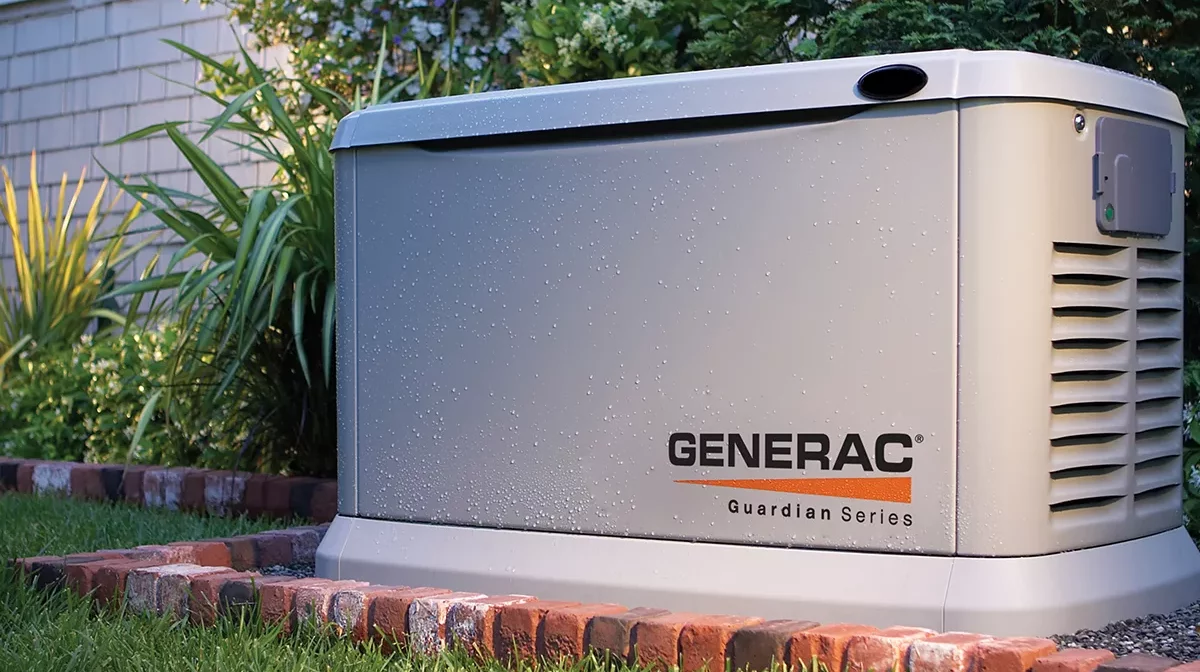
A whole home generator is a permanent power source that’s installed outside your home and connected to your electrical system. Whole home generators run on natural gas or propane and are designed to provide reliable, long-term power to your home during a power outage.
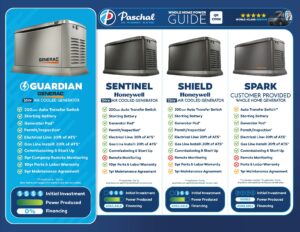
A portable home generator is a compact, gas- or propane-powered unit that provides temporary electricity during a power outage. Designed to be mobile and easy to operate, portable generators are a practical solution for keeping your lights on, your refrigerator running, and your devices charged when the grid goes down.
These generators come in a range of power capacities—measured in watts—so whether you need to run just a few essentials or power multiple appliances, there’s a model that fits your needs.
Depending on the size, a portable generator can power: Refrigerators and freezers, Lights and Fans, Cell phone chargers and small electronics, sump pumps, TVs, small appliances, electric cooktops or microwaves.
Larger portable generators can even support multiple circuits in your home when properly connected, helping you maintain comfort and safety during extended outages.
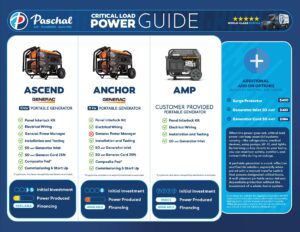
While it’s possible to run extension cords from your generator to individual appliances, a manual transfer switch offers a much safer, more efficient solution.
This device is professionally installed and allows your portable generator to connect directly to your home’s electrical panel. With a simple flip of a switch, you can safely redirect power from the generator to selected circuits in your home—eliminating the need for multiple cords and reducing the risk of overload or back feeding.
Benefits of a Manual Transfer Switch:
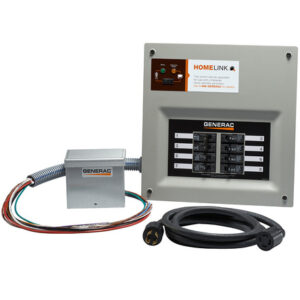
The total price of a generator installation depends on several factors like the size of the home, how the utilities are set up, and the homeowner’s power needs. We work with our customers to give options rather than a one-size-fits-all price.
Portable generators are typically less expensive than whole home generators, and pricing can vary based on how much power KW you expect the generator to handle. Where a portable generator may make sense if you only expect it to maintain a refrigerator or freezer a whole home generator can be customized for the specific breakers or appliances that you want to control.
Choosing Between a Whole Home & Portable Generator
Both portable generators and whole home generators have their own unique benefits, but for homeowners that care about preventing power outages, a whole home generator is the clear winner. With reliability, convenience, and peace of mind, a whole home generator is the best choice for those who want a permanent, long-term power source for their homes. While the initial cost may be higher, the benefits of having a whole home generator far outweigh the cost, and will provide you with the security and comfort you need during power outages.
Investing in a whole home generator may seem like a big expense, but it’s important to consider the peace of mind it provides and the benefits it offers in the long run. With a whole home generator, you won’t have to worry about losing power in the middle of a storm, and you’ll be able to keep your essential appliances, medical devices and work-from-home setups running during power outages. Not sure what’s the right size for your needs or simply want to figure out how much you can run by appliance size?
✅ Quick Generator Comparison – Which One Fits Your Needs?
If you want quick portability and lower cost, a portable generator may be your pick. If you want seamless, automatic backup for your entire home, a whole home generator is the way to go.
Portable Generator
Whole Home Generator
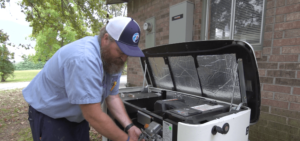
Generator Setup & Safety – Trust the Professionals
Having a licensed professional install your portable generator with a manual transfer switch—or a whole home generator—is crucial for both safety and performance. Improper installation can lead to serious hazards like electrical fires, backfeeding into utility lines, or carbon monoxide exposure. A licensed technician ensures your generator is correctly sized, safely connected to your electrical system, and compliant with local codes and utility requirements. Whether it’s a manual transfer switch or a fully automated whole home unit, professional installation gives you peace of mind that your backup power system will work reliably when you need it most.
Safety tips for Portable Generators
Safety tips for Whole Home Generators
Still need help deciding? When it comes to making the decision, it’s time to call our professional team at Paschal Air, Plumbing & Electric for a free estimate and consultation. Getting in contact is easy! Simply tap that schedule service button on our site to set up your FREE generator consultation.